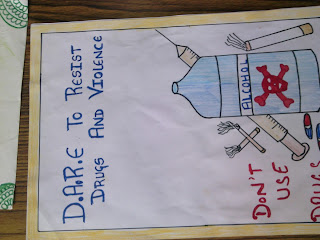
HIV stands for human immunodeficiency virus.
It is the virus that can lead to acquired immunodeficiency
syndrome or AIDS if not treated. Unlike some other viruses,
the human body can’t get rid of HIV completely, even with
treatment. So once you get HIV, you have it for life.
It is the virus that can lead to acquired immunodeficiency
syndrome or AIDS if not treated. Unlike some other viruses,
the human body can’t get rid of HIV completely, even with
treatment. So once you get HIV, you have it for life.
HIV attacks the body’s immune system, specifically the
CD4 cells (T cells), which help the immune system fight
off infections. Untreated, HIV reduces the number of CD4
cells (T cells) in the body, making the person more likely
to get other infections or infection-related cancers. Over
time, HIV can destroy so many of these cells that the
body can’t fight off infections and disease.
These opportunistic infections or cancers take advantage
of a very weak immune system and signal that the person
has AIDS, the last stage of HIV infection.
CD4 cells (T cells), which help the immune system fight
off infections. Untreated, HIV reduces the number of CD4
cells (T cells) in the body, making the person more likely
to get other infections or infection-related cancers. Over
time, HIV can destroy so many of these cells that the
body can’t fight off infections and disease.
These opportunistic infections or cancers take advantage
of a very weak immune system and signal that the person
has AIDS, the last stage of HIV infection.
No effective cure currently exists, but with proper medical
care, HIV can be controlled. The medicine used to treat
HIV is called antiretroviral therapy or ART. If taken the
right way, every day, this medicine can dramatically
prolong the lives of many people infected with HIV, keep
them healthy, and greatly lower their chance of infecting
others. Before the introduction of ART in the mid-1990s,
people with HIV could progress to AIDS in just a few years.
Today, someone diagnosed with HIV and treated before the
disease is far advanced can live nearly as long as someone
who does not have HIV.
care, HIV can be controlled. The medicine used to treat
HIV is called antiretroviral therapy or ART. If taken the
right way, every day, this medicine can dramatically
prolong the lives of many people infected with HIV, keep
them healthy, and greatly lower their chance of infecting
others. Before the introduction of ART in the mid-1990s,
people with HIV could progress to AIDS in just a few years.
Today, someone diagnosed with HIV and treated before the
disease is far advanced can live nearly as long as someone
who does not have HIV.
When people get HIV and don’t receive treatment, they will
typically progress through three stages of disease.
Medicine to treat HIV, known as antiretroviral therapy
(ART), helps people at all stages of the disease if taken
the right way, every day. Treatment can slow or prevent
progression from one stage to the next. It can also
dramatically reduce the chance of transmitting HIV to
someone else.
typically progress through three stages of disease.
Medicine to treat HIV, known as antiretroviral therapy
(ART), helps people at all stages of the disease if taken
the right way, every day. Treatment can slow or prevent
progression from one stage to the next. It can also
dramatically reduce the chance of transmitting HIV to
someone else.
Stage 1: Acute HIV infection
Within 2 to 4 weeks after infection with HIV, people may
experience a flu-like illness, which may last for a few weeks.
This is the body’s natural response to infection. When people
have acute HIV infection, they have a large amount of virus in
their blood and are very contagious. But people with acute
infection are often unaware that they’re infected because they
may not feel sick right away or at all. To know whether someone
has acute infection, either a fourth-generation antibody/antigen
test or a nucleic acid (NAT) test is necessary. If you think you
have been exposed to HIV through sex or drug use and you
have flu-like symptoms, seek medical care and ask for a
test to diagnose acute infection.
experience a flu-like illness, which may last for a few weeks.
This is the body’s natural response to infection. When people
have acute HIV infection, they have a large amount of virus in
their blood and are very contagious. But people with acute
infection are often unaware that they’re infected because they
may not feel sick right away or at all. To know whether someone
has acute infection, either a fourth-generation antibody/antigen
test or a nucleic acid (NAT) test is necessary. If you think you
have been exposed to HIV through sex or drug use and you
have flu-like symptoms, seek medical care and ask for a
test to diagnose acute infection.
Stage 2: Clinical latency (HIV inactivity or dormancy)
This period is sometimes called asymptomatic
HIV infection or chronic HIV infection.
During this phase, HIV is still active but reproduces at very
low levels. People may not have any symptoms or get sick
during this time. For people who aren’t taking medicine to
treat HIV, this period can last a decade or longer, but some
may progress through this phase faster. People who are
taking medicine to treat HIV (ART) the right way, every
day may be in this stage for several decades. It’s important
to remember that people can still transmit HIV to others
during this phase, although people who are on ART and
stay virally suppressed (having a very low level of virus in
their blood) are much less likely to transmit HIV than
those who are not virally suppressed. At the end of this
phase, a person’s viral load starts to go up and the CD4
cell count begins to go down. As this happens, the
person may begin to have symptoms as the virus levels
increase in the body, and the person moves into Stage 3.
HIV infection or chronic HIV infection.
During this phase, HIV is still active but reproduces at very
low levels. People may not have any symptoms or get sick
during this time. For people who aren’t taking medicine to
treat HIV, this period can last a decade or longer, but some
may progress through this phase faster. People who are
taking medicine to treat HIV (ART) the right way, every
day may be in this stage for several decades. It’s important
to remember that people can still transmit HIV to others
during this phase, although people who are on ART and
stay virally suppressed (having a very low level of virus in
their blood) are much less likely to transmit HIV than
those who are not virally suppressed. At the end of this
phase, a person’s viral load starts to go up and the CD4
cell count begins to go down. As this happens, the
person may begin to have symptoms as the virus levels
increase in the body, and the person moves into Stage 3.
Stage 3: Acquired immunodeficiency syndrome (AIDS)
AIDS is the most severe phase of HIV infection. People with
AIDS have such badly damaged immune systems that they
get an increasing number of severe illnesses, called
opportunistic illnesses.
AIDS have such badly damaged immune systems that they
get an increasing number of severe illnesses, called
opportunistic illnesses.
Without treatment, people with AIDS typically survive about
3 years. Common symptoms of AIDS include chills, fever,
sweats, swollen lymph glands, weakness, and weight loss.
People are diagnosed with AIDS when their CD4 cell count
drops below 200 cells/mm or if they develop certain
opportunistic illnesses. People with AIDS can have a
high viral load and be very infectious.
3 years. Common symptoms of AIDS include chills, fever,
sweats, swollen lymph glands, weakness, and weight loss.
People are diagnosed with AIDS when their CD4 cell count
drops below 200 cells/mm or if they develop certain
opportunistic illnesses. People with AIDS can have a
high viral load and be very infectious.
SCHOOL PICS-USM


















































